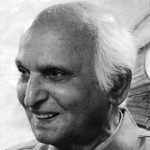
Revolution, Bhagat Singh style
Performed at AlHamra, the play has no real plot. It is just a large-scale expression of a revolutionary passion.
A man admitted today to being taken entirely by surprise two days ago. He had bought the ticket for a theatre performance at Alhamra but on entering the darkened hall, found it resonating with chants for revolution. He says he paused and then reluctantly exited the hall, only to be assured by a bystander that the activity at the hall was not political and that it was indeed a theatre performance.
The play is about Bhagat Singh and the slogan now belongs to history though contemporary politics may have no use for it. The times we are talking about were the days when the movement for a free India was at its peak. Revolution was the primary slogan at every Congress rally. But raising slogans was as far as Congress would go. Then a real revolutionary emerged on the scene, made a splash with a tiny group of supporters and soon marched to the gallows, graduating to a legend.
Bhagat Singh, the young man, was born in a Sikh family of Lyallpur. Growing up, he first foreswore religion, then joined the National College set up by Lala Lajpat Rai at Bradlaugh Hall.
Bhagat Singh has been a legend but for decades his mention in Lahore was limited to somebody stopping some day at Shadman Chowk and remembering that this was the place where he was executed. Then some people started whispering how it was that Lahore had all but forgotten one of its heroes. One thing led to another and Shahid Mahmood Nadeem wrote the play Mera Rang Dey Basanti Chola. It has now been performed at the Art Council under Madeeha Gohar’s direction.
The play is slightly unusual. There is a thunderous ‘Long Live the Revolution’. The rest is poetry, mostly folk poetry celebrating the Bhagat Singh legend. Now and then an Urdu couplet: Sarfroshi ki tamanna ab hamaray dil mein hai; dekhna hai zaur kitna bazoo-i-qatil mein hai. (Sacrifice for freedom is now on our minds; let’s see how effective our murderous oppressor can still be.)
Strange are the ways some verses gain phenomenal popularity. Often people carried away by one don’t even care about the poet. The job of identifying him is left to researchers.
In this case it was Sukhdev Prashad Bismil Allahabadi. As they say, the muse can be quite whimsical. The couplet ended up being the motto of Bhagat Singh’s group.
In his foreword, Nadeem has mentioned that Bhagat Singh was quite addicted to poetry and that he particularly liked Iqbal. What was the harm then in letting one of Iqbal’s verses into the play? Strange that while so many critics who talked about revolution read fascism into Iqbal’s poetry, the one actual revolutionary read it otherwise and was inspired by it.
One of the songs is called ‘Ghori’ (mare). Nadeem says a Lahori tongawalla had written and first read it standing in his tonga on the first anniversary of Bhagat Singh’s execution.
The songs are sung by a choir and create an atmosphere. The play has no real plot. It is just a large-scale expression of a revolutionary passion. The kind of sentiment is not easy to evoke through a prose narrative. Poetry helps overcome this difficulty.
The slogans raised now and then add their own magical effect. Some slogans are bound to prove more evocative than others. This was a time in India’s history when people speaking very diverse languages were together in demanding freedom. Their differences had yet not reached the exclusion stage. ‘Long Live the Revolution’ did not belong to a particular party.
Also note how a verse so dominated by Persian and Arabic phrases trumped slogans in local languages because it best captured and expressed the grassroots sentiment.
*Translated from Urdu
Published in The Express Tribune




COMMENTS
Comments are moderated and generally will be posted if they are on-topic and not abusive.
For more information, please see our Comments FAQ